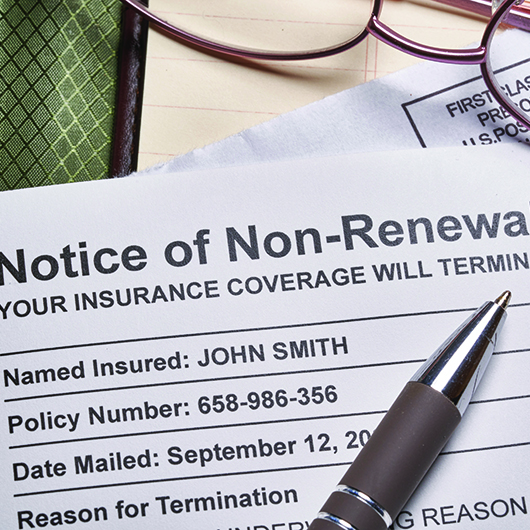 Contractual provisions that
Contractual provisions that
new agents should be aware of
New agents almost certainly aren’t aware of the
language contained within carrier contracts,
but this needs to be considered any time claims are concerned.
By Marc McNulty, CIC, CRM
New agents have plenty to worry about as they get up and running, because learning products, the agency management system, and carrier websites must be balanced with marketing efforts and growing their books. However, that’s not all they need to worry about, as inevitably they will be asked one of the following important questions by their clients:
“I backed into a pole and there’s minor damage to my car. Should I turn in an auto claim?”
“How much will my rates go up if I turn in a claim?”
“Will I get cancelled if I turn in a claim?”
While you truthfully may not know the answer to these questions, there are contractual obligations that dictate part of this process.
Those who are new to the industry may be so eager to sell and learn the basics of what they are selling that they miss out on important policy provisions, including those that pertain to claims reporting. And not knowing these provisions—or at least pointing them out to insureds—could prove to be costly in more ways than one.
While we aren’t here to provide any legal advice on what new agents should do, the goal is to make new agents aware of contractual provisions that should be considered in conjunction with the claims reporting process.
Carrier provisions
Let’s start at the highest level, which is the carrier/agency relationship. New agents almost certainly aren’t aware of the language contained within carrier contracts, but this needs to be considered any time claims are concerned.
While some contracts contain lengthier provisions, others are very straightforward. Following is an example of language contained within a contract our agency has with a national carrier:
“You will promptly report to us and process all claims in accordance with our policy provisions and procedures.”
Straightforward enough, right? The keys here are the “policy provisions and procedures,” which we will get to shortly.
Another example is the following from a super-regional carrier:
In accordance with your authority under the Authority Addenda and the terms of this Agreement, you shall have the following non-delegable duties and responsibilities:
…
- To promptly notify the Company in writing upon receipt of notice of any claims, suits or losses under the Company’s policies, and to cooperate with the Company in the investigation and adjustment of claims and in the collection of deductible reimbursements.
This should get your attention, as the non-delegable duties and responsibilities go beyond merely reporting or processing claims.
Every carrier contract will have some sort of language like this pertaining to the prompt reporting of claims, so make sure you’re aware of your agency’s contractual obligations to its carriers.
Policy provisions
This can be a sore subject for insureds, as I have seen plenty of people cancelled for claims history when one or even two of the claims on record had zero paid out on them. However, when carriers begin to detect a frequency issue, some will cut ties with insureds—even if some of the claims resulted in no payments. That’s a whole different topic, though!
Any time you see this situation, you will almost certainly be told the following:
“I wouldn’t have turned in that claim if I knew I would be cancelled over it.”
However, things aren’t always so simple, as policy language plays a large role in this situation.
Several years ago, “Mind the Gap” examined duties after a loss, and included in these duties is the prompt reporting of claims. For example, the following language is found in the HO 00 05 03 22 edition of the Homeowners 5 – Comprehensive Form:
In case of a loss to covered property, we have no duty to provide coverage under this Policy if the failure to comply with the following duties is prejudicial to us. These duties must be performed either by you, or an “insured” seeking coverage or a representative of either:

- Give prompt notice to us or our agent.
If notice of a loss is promptly given to you and your carrier contract specifies you are to promptly report claims to them, that doesn’t leave much wiggle room, does it?
Similarly, the Personal Auto Policy (PP 00 01 09 18) lays out specific duties after an accident or loss:
We have no duty to provide coverage under this Policy if the failure to comply with the following duties is prejudicial to us:
- We must be notified promptly of how, when and where the accident or loss happened. Notice should also include the names and addresses of any injured persons and of any witnesses.
Again, this leaves little to interpretation.
However, note that both provisions contain the language “prejudicial to us.” There may be instances where a client wants to obtain an estimate for minor damage to their auto before reporting the claim to the carrier (a tree branch fell on their car, for example, and there is no bodily injury to others). In such situations, waiting a few days to determine the amount of total damage may not be considered prejudicial to the carrier.
But this doesn’t mean you have this kind of potential leeway with all policies, though.
Professional liability, employment practices liability, directors and officers liability, and other executive liability policies contain detailed and strict wording regarding the prompt reporting of claims. Here is an example:
The Insureds shall, as a condition precedent to the obligations of the Insurer under this Policy, give written notice to the Insurer of each Claim as soon as practicable after a Responsible Person first becomes aware of such Claim, but in no event later than:
(a) ninety (90) days after the termination or expiration of the Policy Period or Coverage Part, provided that the Policy has not been renewed by the Insurer or extended by purchase of an Extended Reporting Period; or
(b) the expiration of the Extended Reporting Period.
Not all forms have specific timeframes, though. However, they may have additional duties set forth:
The insureds shall give us written notice of any claim made against any of the insureds for a wrongful act as soon as practicable after any executive of the named insured has knowledge of such claim, and shall cooperate and provide information as we may reasonably require, including but not limited to providing a description of the claim, the nature of the alleged wrongful act, the nature of the alleged injury, the names of the claimants, and the manner in which the insureds first became aware of the claim. As soon as practicable, the insureds shall furnish us with copies of reports, investigations, pleadings and other papers in connection with the claim.
Furthermore, insureds need to consider that the late reporting (or not reporting) of claims could jeopardize renewal coverage. Executive liability renewal applications will have a prior knowledge/warranty section asking if the applicant is aware of any fact or circumstance that may give rise to a claim. If such questions are not answered truthfully, the fallout could be severe.
No one wants to be involved in an E&O lawsuit, so always consider your agency’s contractual obligations to its carriers and your insured’s obligations to their carrier(s) any time potential claims are brought forth. You’ll be glad you did.
The author
Marc McNulty, CIC, CRM, is a principal at The Uhl Agency in Dayton, Ohio, and has been with the agency since 2001. He divides his time among sales, marketing, technology and operational duties. You can reach Marc at marcmcnulty@uhlagency.com.




